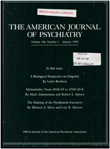Depression in women treated for gynecological cancer: clinical and neuroendocrine assessment
Abstract
To determine the prevalence of major depression in cancer patients and assess the usefulness of the dexamethasone suppression test (DST) and the thyrotropin-releasing hormone (TRH) stimulation test for diagnosing major depression in these patients, the authors studied 83 women hospitalized for gynecological cancer. Nineteen (23%) had major depression according to DSM-III criteria. The sensitivity and specificity of the DST were 40% and 88%, respectively. No relationship between DST and TRH test results was found. These findings indicate a high prevalence of depression in cancer patients, but further research on these tests in cancer patients is needed; their routine use with cancer patients is premature at this time.
Access content
To read the fulltext, please use one of the options below to sign in or purchase access.- Personal login
- Institutional Login
- Sign in via OpenAthens
- Register for access
-
Please login/register if you wish to pair your device and check access availability.
Not a subscriber?
PsychiatryOnline subscription options offer access to the DSM-5 library, books, journals, CME, and patient resources. This all-in-one virtual library provides psychiatrists and mental health professionals with key resources for diagnosis, treatment, research, and professional development.
Need more help? PsychiatryOnline Customer Service may be reached by emailing [email protected] or by calling 800-368-5777 (in the U.S.) or 703-907-7322 (outside the U.S.).



